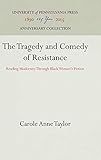The Tragedy and Comedy of Resistance : Reading Modernity Through Black Women's Fiction / Carole Anne Taylor.
Material type: TextSeries: Penn Studies in Contemporary American FictionPublisher: Philadelphia : University of Pennsylvania Press, [2017]Copyright date: ©2000Edition: Reprint 2016Description: 1 online resource (288 p.)Content type:
TextSeries: Penn Studies in Contemporary American FictionPublisher: Philadelphia : University of Pennsylvania Press, [2017]Copyright date: ©2000Edition: Reprint 2016Description: 1 online resource (288 p.)Content type: - 9780812235104
- 9781512819595
- African American women in literature
- African American women -- Intellectual life
- African Americans in literature
- American fiction -- African American authors -- History and criticism
- American fiction -- Women authors -- History and criticism
- American fiction -- 20th century -- History and criticism
- Modernism (Literature) -- United States
- Women and literature -- United States -- History -- 20th century
- LITERARY CRITICISM / American / African-American
- African Studies
- African-American Studies
- Cultural Studies
- Literature
- 813.509928708996 21
- PS374.N4
- online - DeGruyter
- Issued also in print.
| Item type | Current library | Call number | URL | Status | Notes | Barcode | |
|---|---|---|---|---|---|---|---|
 eBook
eBook
|
Biblioteca "Angelicum" Pont. Univ. S.Tommaso d'Aquino Nuvola online | online - DeGruyter (Browse shelf(Opens below)) | Online access | Not for loan (Accesso limitato) | Accesso per gli utenti autorizzati / Access for authorized users | (dgr)9781512819595 |
Frontmatter -- Contents -- Prologue: Ideologies of the Terrible and the Funny -- Part I. Revising Postmodernity: Storytelling as Theory -- 1. The Tragedy of Slavery and the Footprints' Fit: Vicarious Witnessing in Beloved -- 2. Humor, Subjectivity, Unctuousness: The Case of Laughter in The Color Purple and The Women of Brewster Place -- 3. Tragedy and Comedy Reborn(e): The Critical Soul-Journeys in A Question of Power and The Salt Eaters -- Part II. Reading Recursively: Against Modernism's Apartheid -- 4. Who Owns the Terror in Absalom, Absalom!?: Quentin's Marriage and Clytie's Fire -- 5. Literary Passing: Ida, "Melanctha," and the Andrew-gyne -- 6. World-Traveling as Modal Skid: Hurston and Vodou -- Epilogue: Critical (Post)modernity: At the Borders of Arrogance and Possibility -- Notes -- Bibliography -- Index -- Acknowledgments
restricted access online access with authorization star
http://purl.org/coar/access_right/c_16ec
Carole Anne Taylor explores the network of cultural relations that links tragic and comic theory to views of what can or cannot be known or felt and what can or cannot be done. Reconceiving tragic and comic resistance through readings of works by Toni Morrison, Alice Walker, Gloria Naylor, Toni Cade Bambara, and South African-born Bessie Head, she demonstrates how these writers elaborate the interconnections between a comedy that affirms wholesome normalcy in the face of terror and a tragedy that finds something terribly wrong in the social order itself. Paradoxically, she contends, these works place the highest value not on texts, reading, and writing, but on actual relationship and social action. Looking backward, Taylor next does a "recursive reading" of some problematic works by William Faulkner, Gertrude Stein, and Zora Neale Hurston that have often been considered precursors of the "postmodern." Reading these earlier authors under the influence of contemporary texts and current theory explains modern artfulness or its lack, even when representations of the terrible and the funny offer conflicted relations to power and conflicted sites for readerly response. Taylor argues that the ellipsis of certain tragic and comic modes, particularly in theories of how and when the modern becomes the postmodern, corresponds to the repression of intercultural dialogue on a broader scale. Throughout, she makes a strong case that the tragedy and comedy of resistance should lie at the heart of theories of a critical (post)modernity--and can illuminate the connections between how to read and how to live in the world.
Issued also in print.
Mode of access: Internet via World Wide Web.
In English.
Description based on online resource; title from PDF title page (publisher's Web site, viewed 24. Apr 2022)


